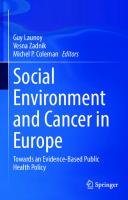Towards Better Reproductive Health in Eastern Europe: Concern, Commitment, and Change 9789633865064
Documenting the latest statistical data on current problems related to reproductive health issues in Central and Eastern
150 31 3MB
English Pages 166 [164] Year 1998
Contents
List of tables
List of figures
List of contributors
Foreword
Reproductive health in Eastern Europe: an overview and the challenges ahead
Can a process of quality assurance improve pregnancy outcome?
The challenge of rising trends in the incidence of sexually transmitted diseases in Eastern Europe
Obstacles and opportunities in the development of adolescent reproductive health care
Contraception: current use and future perspectives
How can the rates of induced abortion be reduced?
Infertility in Eastern Europe: a survey of the current status in nine countries
Towards better reproductive health in Eastern Europe
Recommend Papers

- Author / Uploaded
- WHO Scientific Working Group (editor)
File loading please wait...
Citation preview
Towards Better Reproductive Health in Eastern Europe
Towards Better Reproductive Health in Eastern Europe Concern, Commitment, and Change Edited by
G. LINDMARK, M. HORGA, A. CAMPANA, andJ. KASONDE WHO Scientific Working Group on Reproductive Health Research
..
.'.
.. CEU PRESS
••• Central European University Press
World Health Organization
Published by Central European University Press Okt6ber 6. utca 12 H-1051 Budapest Hungary 400 West 59th Street New York, NY 10019 USA
© 1999 by WHO, Geneva Distributed by Plymbridge Distributors Ltd., Estover Road, Plymouth PL6 7PZ, United Kingdom All rights reserved. No part of this publication may be reproduced, stored in a retrieval system, or transmitted, in any form or by any means, without the permission of the Publisher. ISBN 963-9116-30-0 ISBN 9789633865064 ebook
Graphic artwork on cover by Tamas Karacsony and Tamas Maros Library of Congress Cataloging in Publication Data A CIP catalog record for this book is available upon request Printed in Hungary by Akademiai Nyomda Kft.
Contents
List of tables .
Vll
List of figures
lX
List of contributors
Xl
Foreword by J.E.Asvall
Xlll
Reproductive health in Eastern Europe: an overview and the challenges ahead HELENA HONKANEN
and GIUSEPPE BENAGIANO
. . . . . . . . .
Can a process of quality assurance improve pregnancy outcome? GUNILLA LINDMARK . . . . . . . . . . . . . . . . . . . . . . . .
The challenge of rising trends in the incidence of sexually transmitted diseases in Eastern Europe A. GROMYKO
. . . . . . . . . . . . . . . . . . . . . . . . . . . . . .
Obstacles and opportunities in the development of adolescent reproductive health care GUNTA LAZDANE
and ILONA AUZINA
. . V
19
47
65
Contraception: current use and future perspectives LASZL6 KovAcs . . . . . . . . . . . . . . . . . . . . . . . .
85
How can the rates of induced abortion be reduced? MIHAI HORGA
and FRANK LDDICKE . . . . . . . . . . . . . .
99
Infertility in Eastern Europe: a survey of the current status in nine countries FRANK LDDICKE, ASSIA BRANDRUP-LUKANOW, MIHAi HORGA and ALDO CAMPANA . . . . . . . . . . . . . . . . . . . . . . . . . .
129
Towards better reproductive health in Eastern Europe ASSIA BRANDRUP-LUKANOW . . . . . . . . . . . . . . . . . . .
Vl
143
List of tables
2.1 American College of Obstetricians and Gynecologists Ob stetric Clinical Indicators -p. 35 2.2 Key common European quality development indicators in perinatal care (O BSQUID project) -p. 3 6 2.3 Perinatal mortality in the year 1995, Tallinn, Tartu, and Estonia, using different birthweight cutoff points -p. 37 2.4 Common Nordic-Baltic perinatal death classification -p. 3 7 2.5 Perinatal deaths by categories of the Nordic-Baltic perinatal death classification in Lithuania 1993-94 and Denmark and Sweden 1991-p. 38 5.1 Contraceptive use in several countries -p. 94 5.2 Survey on human sterilization in Eastern Europe -p. 95 5.3 Contraceptive prevalence and reproductive health indicators -p. 95 6.1 Fertility, birth, abortion, and contraception prevalence rates in countries of Eastern Europe -p. 12 6 7.1 Existence of referral centers and national organizations deal ing with infertility; specific legislation on donor insemination or adoption in selected countries of EE/NIS -p. 140 7.2 Investigation of infertility as performed by the centers in nine countries of EE/NIS -p. 140. vn
7.3 Possible treatments offered by the centers in nine countries of EE/NIS -p. 141 7.4 Age distribution and type of infertility -p. 141 7.5 Self-reported history, female partner-p. 14 1 7.6 General categories of infertility -p. 14 2 7.7 Distribution of specific diagnoses of infertility -p. 14 2
Vlll
List offigures
1.1 Contraceptive prevalence rate (effective methods) for 100 married women -p. 1 3 1.2 Abortion rate per 1000 women aged 1 5--49 years -p. 1 4 1.3 Abortion to birth ratio per 100 births -p. 1 5 1.4 Maternal mortality rate per 100 000 live births -p. 1 6 1.5 Infant mortality rate per 1000 live births -p. 17 2.1 Maternal mortality rate per 100 000 live births -p. 3 9 2.2 Infant mortality rate per 1000 live births -p. 40 2.3 Health care system: process of quality assurance and im provement -p. 41 2.4 Eclampsia prevalence per 100 000 deliveries (national data) -p. 42 2.5 Blood transfusion national averages and local data, percent of deliveries -p. 43 2.6 Intrapartum deaths per 1000 deliveries -p. 44 2.7 Cesarean sections (national data), percent of deliveries -p. 45 3.1 Incidence of syphilis cases in the Baltic states during the last 1 5 years -p. 56 3.2 Annual incidence of syphilis in the Russian Federation, Be larus, Republic of Moldova, and Ukraine -p. 57 3.3 Annual incidence of syphilis in Kyrgyzstan, 1 98 6-95-p. 58 lX
3.4 Annual incidence of syphilis in the Republic of Kazakhstan, 198 6-95 -p. 59 3.5 Incidence of syphilis cases in the Russian Federation, 199096 -p. 60 3.6 Annual incidence of syphilis cases in Ukraine, 1991-95 -p. 6 1 3.7 Annual incidence of syphilis cases in the Republic of Moldova, 1980-95 -p. 62 3.8 Imported cases of gonorrhea in Helsinki -p. 6 3 3.9 Annual incidence of syphilis cases in Finland, 1980-95-p. 6 4 4.1 Prisoners-juveniles in Latvia -p. 77 4.2 Children who have acquired a basic education in Latvia-p. 78 4.3 Births in Latvia outside marriage -p. 79 4.4 Induced abortions in Latvia in the age group






![Anatomy: A Pressing Concern in Exercise Physiology Commitment to Professionalism [1 ed.]
9781681084695, 9781681084701](https://ebin.pub/img/200x200/anatomy-a-pressing-concern-in-exercise-physiology-commitment-to-professionalism-1nbsped-9781681084695-9781681084701.jpg)


